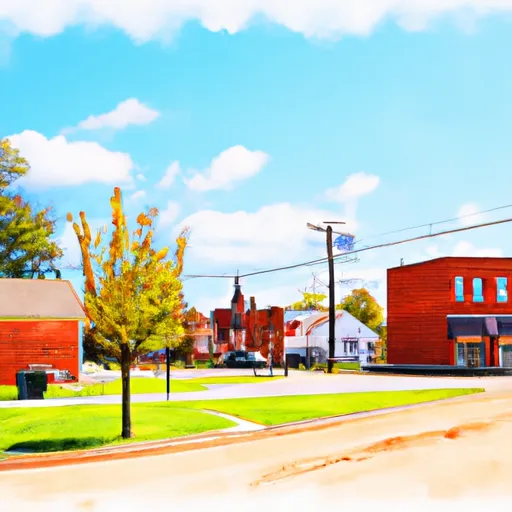-
 Snoflo Premium
Snoflo Premium
Get unlimited access to all our content
With no Ad interruptions! - Start Your Free Trial Login with existing account
Mascoutah
Eden Index
Climate
8.3
•
Recreation
3.1
•
Community
3.3
•
Safeguard
5.2/10

Mascoutah is a charming city located in St. Clair County, Illinois. The climate in Mascoutah is considered humid continental, characterized by four distinct seasons. Summers are warm and humid with average temperatures ranging from the mid-70s to low 90s Fahrenheit, while winters are generally cold with temperatures ranging from the low 20s to mid-40s Fahrenheit.
The hydrology constituents in Mascoutah are mainly influenced by the nearby Mississippi River. The city is not directly situated on the river, but several smaller creeks and streams flow through the area. These water bodies provide opportunities for fishing, boating, and other water-based activities.
For those seeking outdoor recreation opportunities, Mascoutah offers several options. The city operates multiple parks and recreational areas, including Scheve Park and Prairie View Park, which feature amenities like playgrounds, sports fields, and picnic areas. Additionally, Mascoutah is surrounded by beautiful natural landscapes and is close to several state parks, such as Horseshoe Lake State Park and Carlyle Lake, offering opportunities for hiking, camping, and wildlife observation.
Overall, Mascoutah provides a pleasant climate, diverse hydrology constituents, and various outdoor recreational opportunities, making it an appealing destination for nature enthusiasts and outdoor adventurers.
What is the Eden Index?
The Snoflo Eden Index serves as a comprehensive rating system for regions, evaluating their desirability through a holistic assessment of climate health, outdoor recreation opportunities, and natural disaster risk, acknowledging the profound impact of these factors on livability and well-being.
Climate Health Indicator (CHI): 8.3
Mascoutah receives approximately
1037mm of rain per year,
with humidity levels near 84%
and air temperatures averaging around
14°C.
Mascoutah has a plant hardyness factor of
6, meaning
plants and agriculture in this region thrive during a short period during spring and early summer. Most
plants will die off during the colder winter months.
By considering the ideal temperature range, reliable water supplies, clean air, and stable seasonal rain or snowpacks, the Climate Health Indicator (CHI) underscores the significance of a healthy climate as the foundation for quality living.
A healthy climate is paramount for ensuring a high quality of life and livability in a region, fostering both physical well-being and environmental harmony. This can be characterized by ideal temperatures, reliable access to water supplies, clean air, and consistent seasonal rain or snowpacks.
Weather Forecast
Streamflow Conditions
Kaskaskia
Area Rivers
Kaskaskia
Snowpack Depths
Kaskaskia
Reservoir Storage Capacity
Kaskaskia
Groundwater Levels
Recreational Opportunity Index (ROI): 3.1
The Recreational Opportunity Index (ROI) recognizes the value of outdoor recreational options, such as parks, hiking trails, camping sites, and fishing spots, while acknowledging that climate plays a pivotal role in ensuring the comfort and consistency of these experiences.
Access to outdoor recreational opportunities, encompassing activities such as parks, hiking, camping, and fishing, is crucial for overall well-being, and the climate plays a pivotal role in enabling and enhancing these experiences, ensuring that individuals can engage in nature-based activities comfortably and consistently.
Camping Areas
| Campground | Campsites | Reservations | Toilets | Showers | Elevation |
|---|---|---|---|---|---|
| Lake Ross Barnett | 22 | 402 ft | |||
| Dry Creek Water Park | None | 514 ft | |||
| St. Bernard State Park | None | 3 ft | |||
| Walkiah Bluff Water Park | None | 38 ft | |||
| Lake Columbia | 12 | 212 ft | |||
| Roosevelt State Park | None | 562 ft | |||
| Okatoma Water Park | None | 396 ft | |||
| Lake Mike Conner | 20 | 314 ft | |||
| DLo Water Park | None | 312 ft | |||
| Simpson County Lake | 11 | 427 ft |
Nearby Ski Areas
Catastrophe Safeguard Index (CSI):
The Catastrophe Safeguard Index (CSI) recognizes that natural disaster risk, encompassing floods, fires, hurricanes, and tornadoes, can drastically affect safety and the overall appeal of an area.
The level of natural disaster risk in a region significantly affects safety and the overall livability, with climate change amplifying these risks by potentially increasing the frequency and intensity of events like floods, fires, hurricanes, and tornadoes, thereby posing substantial challenges to community resilience and well-being.
Community Resilience Indicator (CRI): 3.3
The Community Resilience Indicator (CRI) recognizes that education, healthcare, and socioeconomics are crucial to the well-being of a region. The CRI acknowledges the profound impact of these elements on residents' overall quality of life. By evaluating educational resources, healthcare accessibility, and economic inclusivity, the index captures the essential aspects that contribute to a thriving community, fostering resident satisfaction, equity, and social cohesion.

